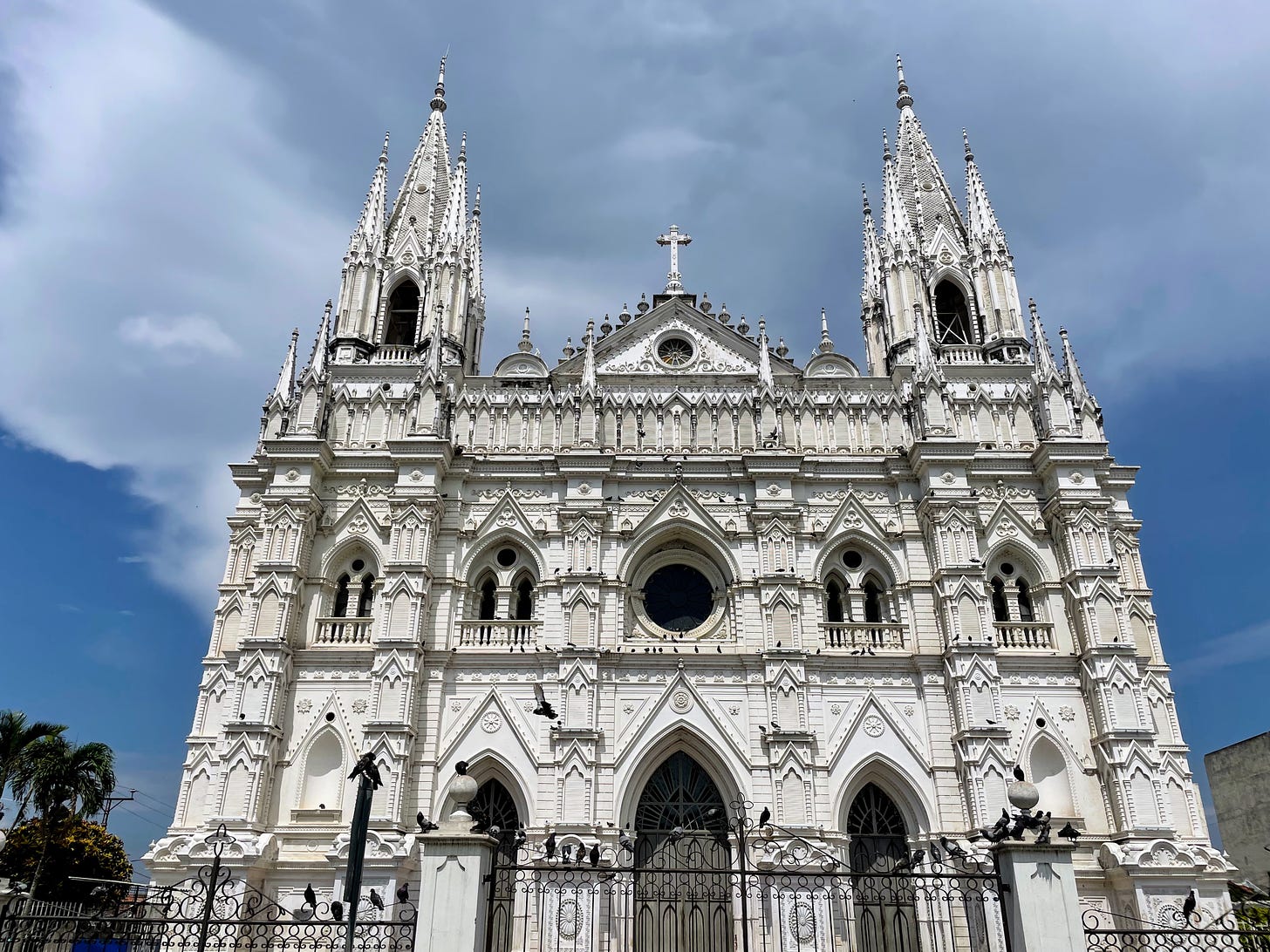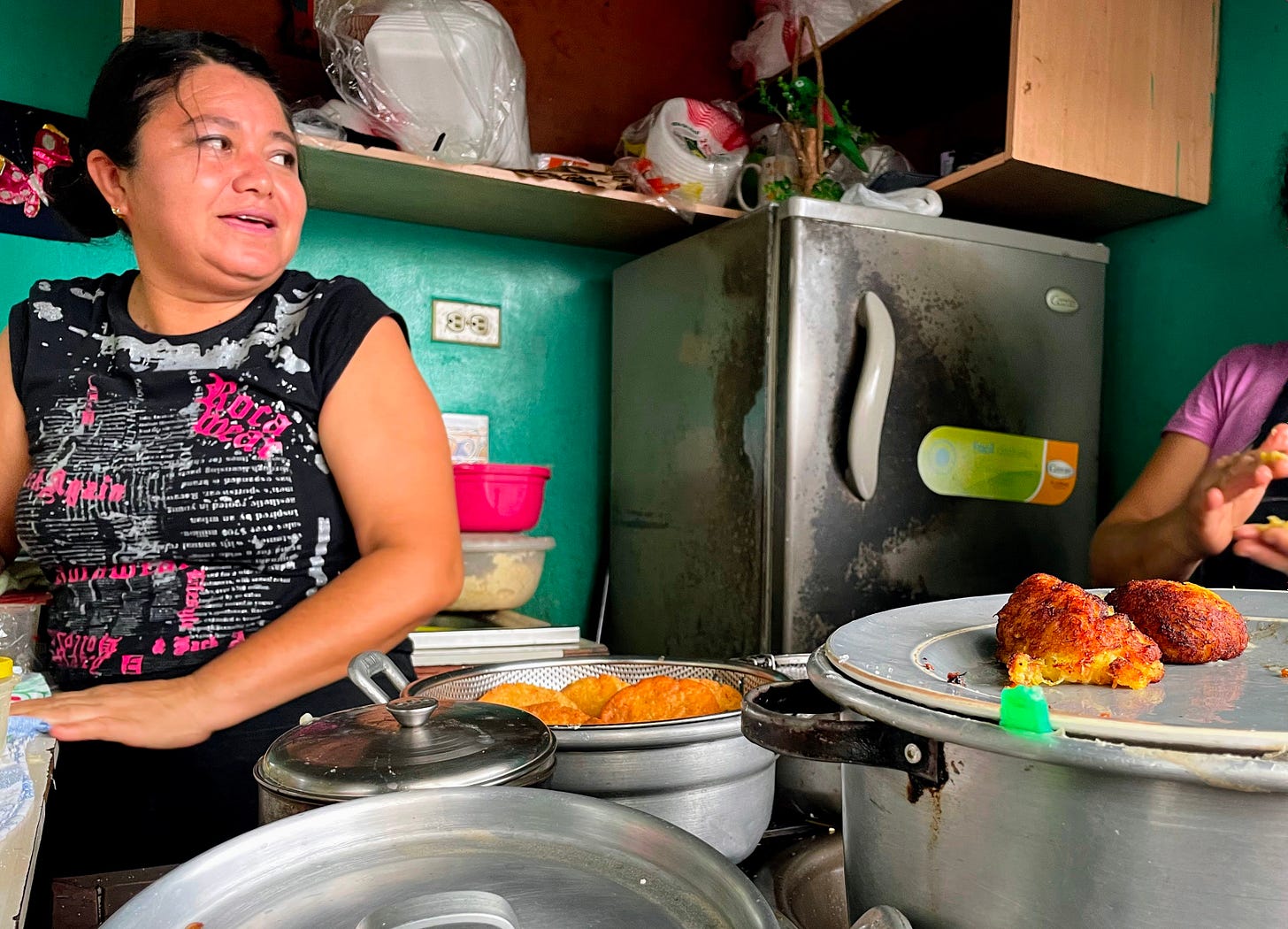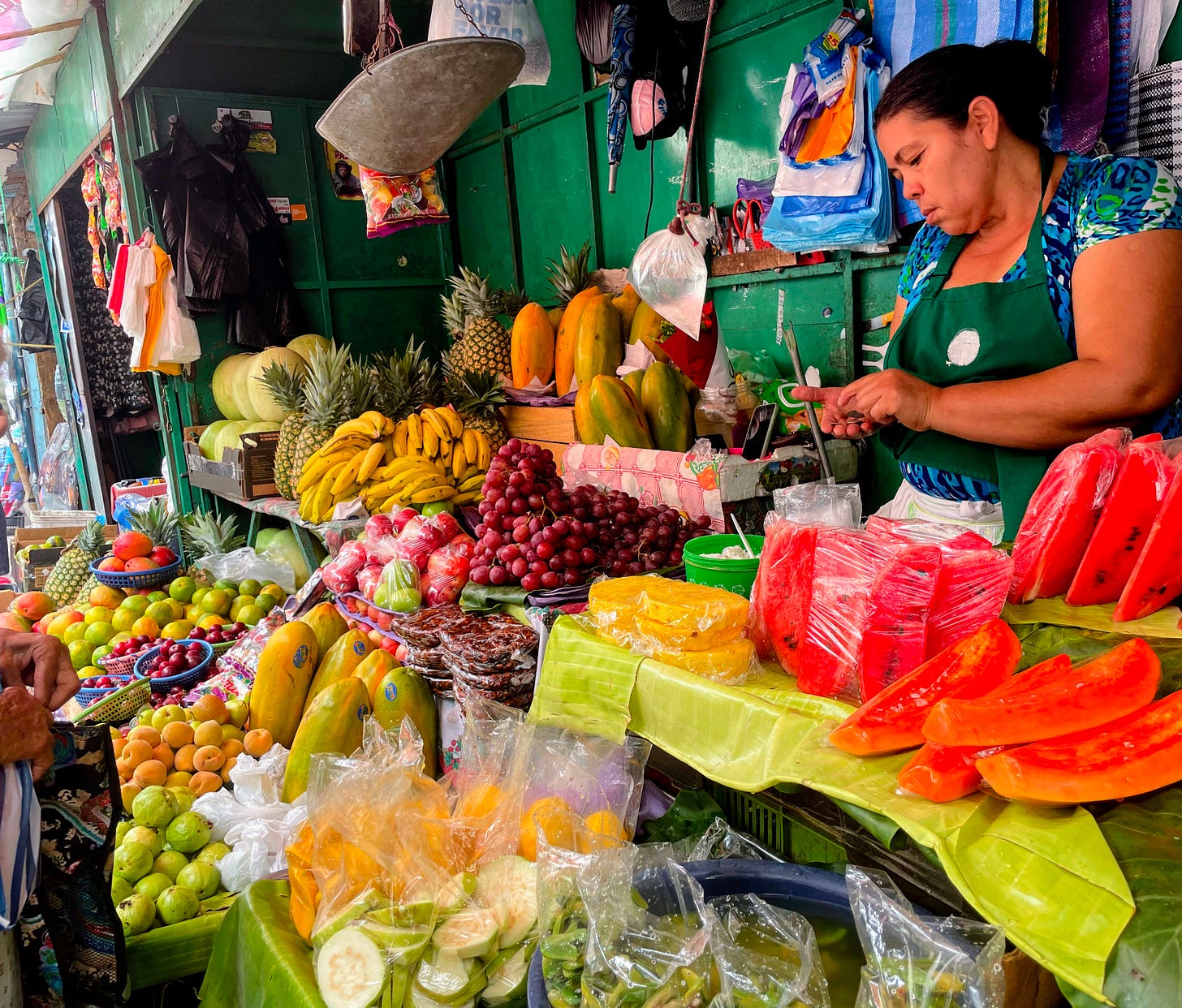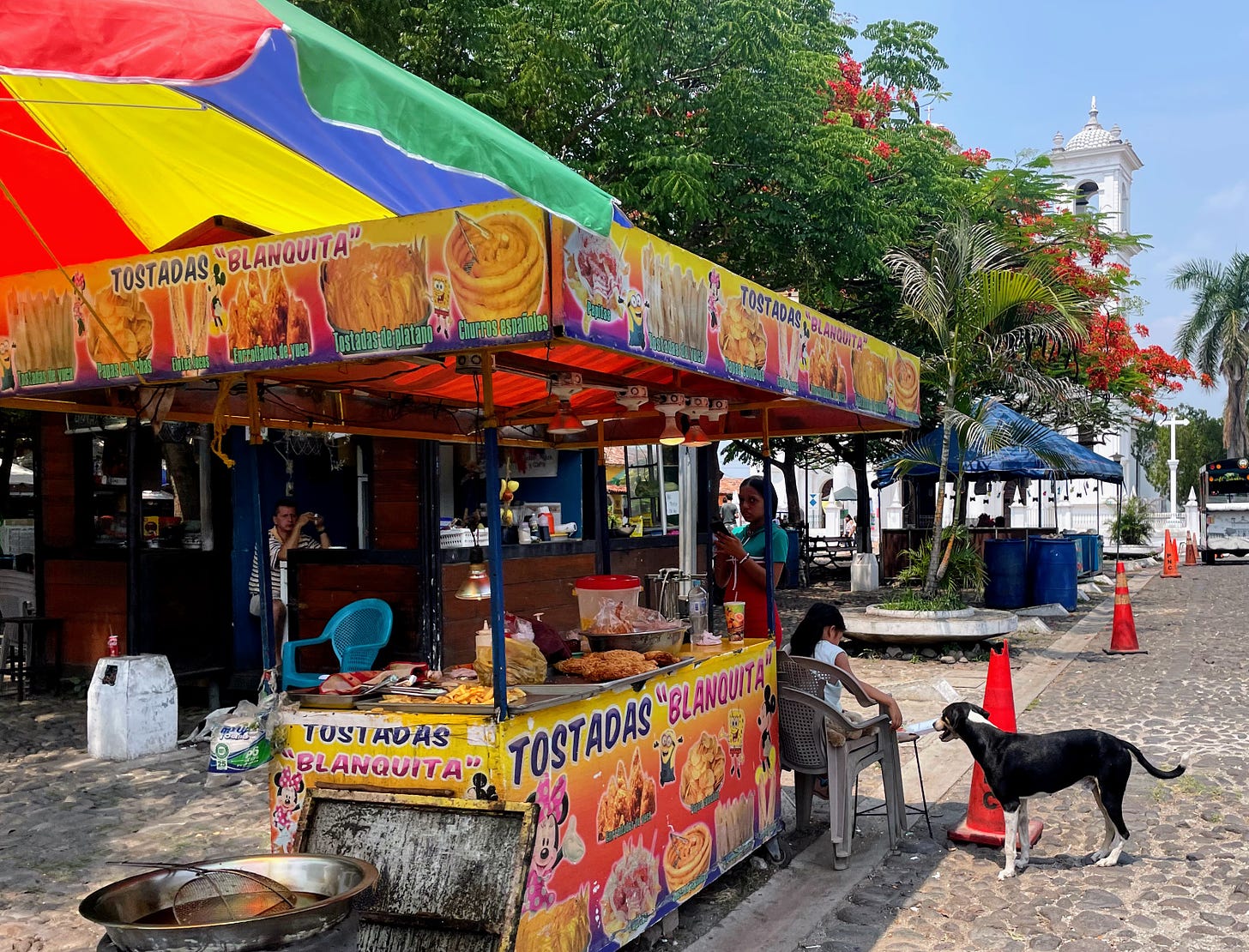"I think it will be like other things. Those with money will get more, and those with less won't benefit" — Mario, a hotel worker in San Salvador
In the summer of 2021, El Salvador’s President announced that the country would become the first in the world to adopt Bitcoin as official currency1. And crypto fans, as has been their nature since time immemorial, didn’t hesitate to take a victory lap.
Crypto advocates aren’t just excited because one country adopted Bitcoin. Some see El Salvador as the proving ground needed to show the world that crypto can work elsewhere — and maybe, even everywhere.
And I agree, actually. El Salvador is, in fact, perhaps the ideal place for some form of cryptocurrency to take off. If it’s going to work anywhere, it should work there.
But the inverse is also true: if crypto doesn’t work in El Salvador — well then, things don’t look so good.
El Salvador is perhaps the ideal place for some form of cryptocurrency to take off. But the inverse is also true — if crypto doesn’t work there, well then, things don’t look good.
Grandes Cambios
I was lucky enough to spend a week in the country last spring, and heard takes on the new currency from numerous Salvadorans, lovers and haters alike. But I also learned about much else that’s happened since President Bukele — the same who steered El Salvador onto the crypto rollercoaster — took office in 2019.
Let’s discuss those changes before we get to Bitcoin. Both because they’re fascinating, and because I don’t believe it’s possible to understand how cryptocurrency is, and is not, changing the country without it.
For one, El Salvador has quite recently become quite safe to visit. This isn’t an accident: since taking office, Bukele’s government has taken an extremely heavy-handed approach to crime. As of last fall, sixteen of every 100 people in the country were in prison, the highest incarceration rate in the world. (Cuba, it’s worth noting, has the second-highest — as discussed in my Cuba posts, the US embargo against the country has been brutal, but Cuba’s government isn’t squeaky-clean, either.)
Human rights groups have sounded alarms regarding Bukele’s tactics — he once even called himself the “world’s coolest dictator.” But it’s notable that nearly everyone I talked to in the country expressed happiness over the job he’s done. I heard in anyone I asked a real sense of joy over the freedom and security they now feel — for some, for the first time in their lives.
Just look at the drop in murder rate per 100k inhabitants over the past several years: a ~45x drop in less than a decade, with especially steep declines since Bukele took office.
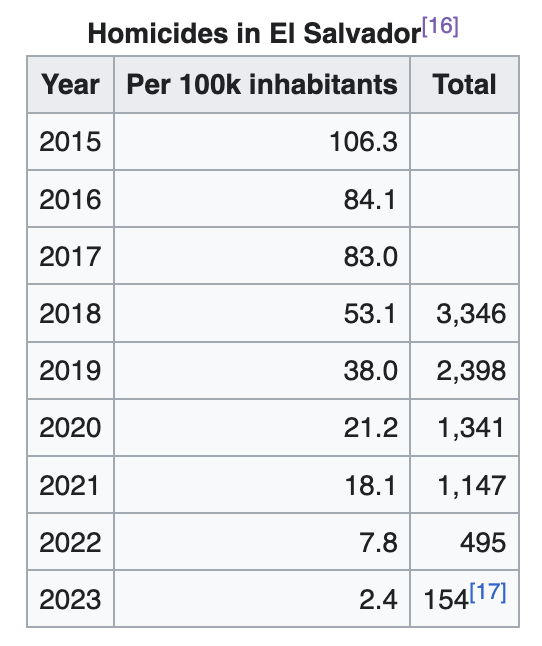
And tourism has predictably grown in turn. The country has rapidly transformed from a place avoided by all but the most intrepid visitors to one where I heard happy stories of tourists hitchhiking along the coast. I even caught an international surf competition featuring young athletes from around the world while there.
As even the same HRW article linked above points out, “El Salvador’s President Nayib Bukele is highly undemocratic, highly abusive — and highly popular.” Indeed, only this month he won re-election in a landslide, garnering 83+% of the popular vote.
A Fertile Proving Ground
Salvadorans have historically competed with a number of financial challenges worth addressing somehow, including a heavy dependence on cash, a highly unbanked citizenry, and a high reliance on money sent home from abroad.
Whether crypto is the best solution for these problems is, of course, another question.
Cash-Heavy and Unbanked
Around 70% El Salvador is — or at least was, before the adoption of digital payments — unbanked. I used to think it odd for an entire term to exist simply to connote “people who don’t have bank accounts,” but a large unbanked population can have real implications for the economy, and for individual lives.
When individuals depend only cash, it of course adds friction to daily transactions, and makes it more difficult to securely store money. But it also makes it hard or impossible to save and earn interest, build credit, receive loans, and participate in the formal economy — which can include the receipt of government services. It also tends to increase corruption in a country.
The 70% unbanked figure is important for evaluating the country’s crypto adoption, too. As discussed last week regarding the rapid uptake of “superapps” in places like China, it’s much easier to bring people onto a new online payments system — or digital cryptocurrency — if they’ve never had access to credit cards or digital payments to begin with.
And it follows that if crypto is going to function as mainstream currency anywhere in the world, it probably should work in El Salvador, where cash was nearly the only alternative prior to crypto’s introduction.
Remittances, without the Fees
Another factor making El Salvador an enticing place to pilot cryptocurrency adoption is that the country relies heavily on remittances, or money sent home from citizens working abroad.
I want to do a post or two on remittances later, but suffice to say they’re a rarely acknowledged engine driving a tremendous amount of money to poor countries. It’s estimated that the total value of global remittances in 2024 will total at least $887 billion — close to Switzerland’s entire GDP. And that’s probably an underestimate, as many remittances go through unofficial channels. According to the IMF, “Egypt’s remittance receipts are greater than revenue from the Suez Canal; Sri Lanka’s exceed tea exports; Morocco’s are larger than tourism earnings.”
And because remittances tend to move money directly between friends and family, the funds often go directly into the hands of those who need it — which is the entire value proposition of the charity Give Directly, which has been celebrated in altruistic and international development circles for years.
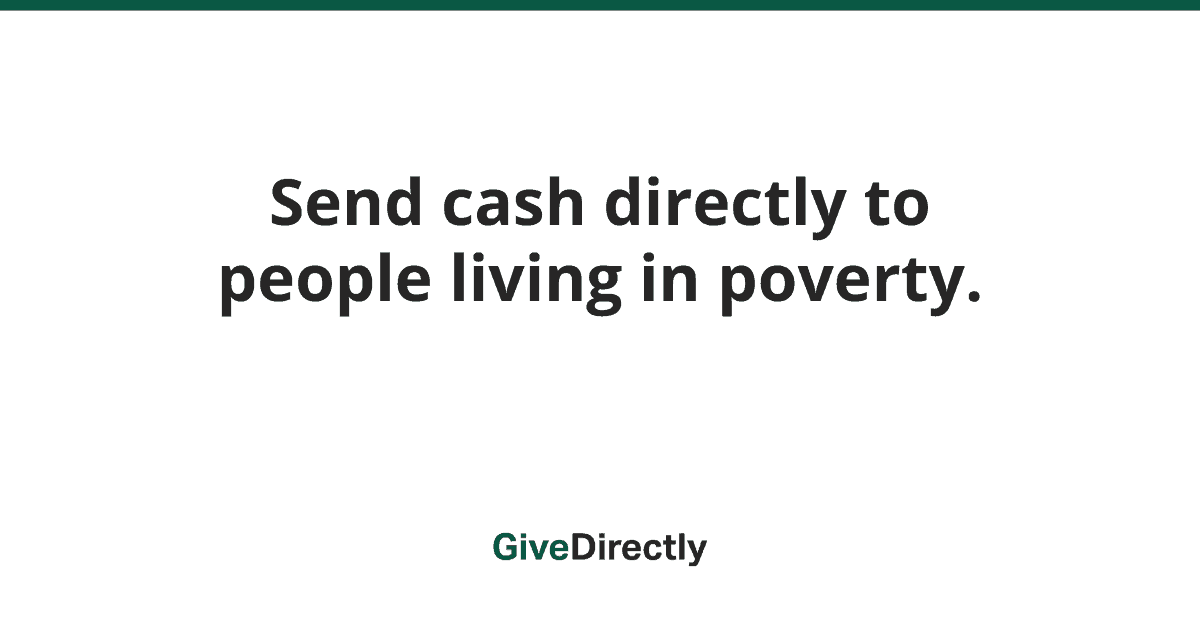
Except for the fees, of course! Remittance companies, including Western Union but also others, have historically charged fees hovering around extortionate. A whopping ~25% of El Salvador’s entire GDP comes from remittances, and according to PWC, Salvadorans sending money home from the US can face fees of up to 30-50% of the transfer value. I’ve never experienced fees that high when using Western Union myself — I usually see closer to 5-10% — but even this is far too much. Compare these charges to those for Venmo, PayPal, or Zelle (free for most personal transfers), or even a bank wire, which can cost $25 or less for even large sums.
So There are Problems — and a Crypto Solution?
Let’s sum up. Why is El Salvador such an interesting, and even promising, proving ground for cryptocurrency?
The country’s economy has been extremely reliant on cash (in a currency dependent on the central bank of another country, the US), which can increase corruption and decrease financial legibility for the overseeing government.
At least as of 2021, 70% of El Salvador’s 6.3 million has been unbanked — and therefore lacking access to savings, investments, credit, loans, and likely adding friction to the receipt of certain government services.
An entire quarter of El Salvador’s economy relies on remittances (money sent home from abroad) — and a great deal of this money is extracted by private companies in the form of hefty fees.
Crypto advocates say the country’s Bitcoin adoption can address these problems. But is it the only, or even best, way to solve them?
Context from Abroad
While cryptocurrency may help fix El Salvador’s financial struggles, it’s by no means the only solution out there — indeed, others have already seen success.
Kenyans began using a service called M-PESA as early as 2007, which allows individuals — even via text, for those without smartphones — to store, transfer, and receive cash throughout the country via accounts tied to their phone numbers and a network of local agents who collect and distribute cash.
M-PESA and similar applications have grown in popularity since, especially in Sub-Saharan Africa, which “accounts for two out of every three dollars sent via mobile money worldwide.”

43% of Ugandans and 72% of Kenyans have mobile money accounts, and the stated mission of one mobile money company even aims to “make Africa the first cashless continent.” M-PESA and the like can be used to send remittances globally, too.
It’s not just sub-Saharan Africa moving rapidly from cash to digital money — as discussed last week, much of east and southeast Asia have done the same with native currencies through apps like AliPay, WeChat and LINE Pay. And digital payments in India grew at an astonishing rate of 50% per year for at least five years following the country’s disruptive banknote demonetization. When I visited India last month, I finally set up Google Pay on my phone because it was often easier to use than cash.
If it Looks and Quacks like M-PESA…
Does it even matter that it’s crypto?
Put another way, if M-PESA and similar solutions using countries’ extant currencies have already succeeded in places facing similar financial challenges to El Salvador — heavy cash dependence, a large unbanked population, and a large volume of remittances — will cryptocurrency do anything special for most Salvadorans?
Or is all the country’s crypto hype just waiting to be disrupted by the entrance of some, any, other mobile money platform — like M-PESA, Venmo, or AliPay?
That is, in fact, precisely what I went to El Salvador to find out. But this post is getting long, so come back next week and I’ll share what I learned :) I’m sorry to tease! But I promise it’ll be good.
Song of the Week: ROSALÍA — F*cking Money Man (Milionària + Dio$ No$ Libre Del Dinero)
Cryptocurrency in El Salvador hasn’t replaced anything by the way — at least not yet. It now functions alongside the US Dollar, the country’s other official currency since 2001. It may sound strange for a foreign country to use US Dollars, but in fact eleven countries outside the US — including Panama, Ecuador, and Zimbabwe — officially use the dollar. And others, like Cambodia, transact it informally alongside national currencies.




